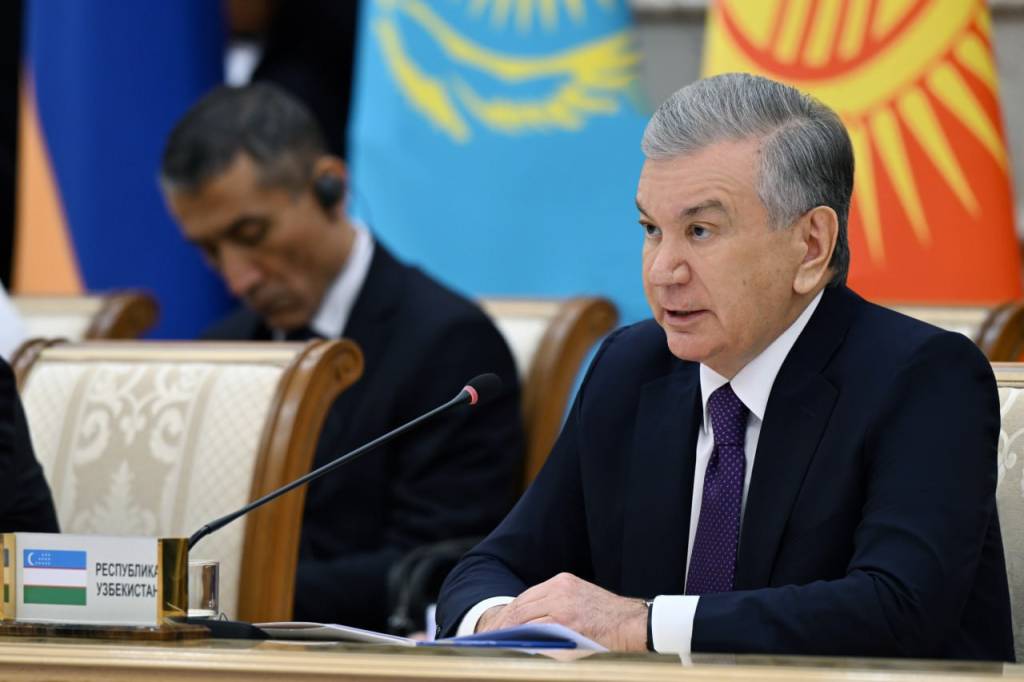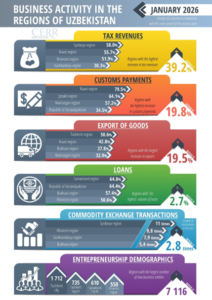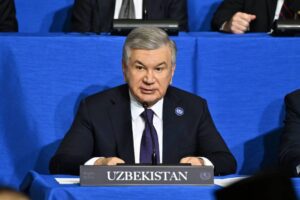President of Uzbekistan Participates in Supreme Eurasian Economic Council Meeting in Minsk

Minsk, The Gulf Observer: President of the Republic of Uzbekistan Shavkat Mirziyoyev took part in the regular meeting of the Supreme Eurasian Economic Council (SEEC) in Minsk, Belarus, in his capacity as the head of an observer state under the Eurasian Economic Union (EAEU).
The summit, chaired by President of the Republic of Belarus Aleksandr Lukashenko, brought together leaders and high-level representatives from member and observer states. Among the distinguished participants were President Kassym-Jomart Tokayev of Kazakhstan, President Sadyr Japarov of Kyrgyzstan, President Vladimir Putin of the Russian Federation, President Miguel Díaz-Canel of Cuba, and President Masoud Pezeshkian of Iran (via video address). Chairman of the Board of the Eurasian Economic Commission Bakytzhan Sagintayev also participated. Guests included Crown Prince Sheikh Khaled Al Nahyan of Abu Dhabi, First Deputy Prime Minister of Mongolia Nyam-Osor Uchral, and Commonwealth of Independent States (CIS) Secretary General Sergey Lebedev.
The agenda focused on enhancing multilateral trade and economic cooperation, supporting industrial collaboration, and advancing joint programs across priority areas of mutual interest.
In his address, President Mirziyoyev emphasized that expanding and deepening mutually beneficial ties with EAEU countries remains a cornerstone of Uzbekistan’s foreign economic strategy. He expressed appreciation to member states for their support and active participation in major events hosted by Uzbekistan, including the International Industrial Exhibition “Innoprom. Central Asia” and the Fourth Tashkent Investment Forum. These events, he noted, led to significant agreements and unveiled promising new areas for cooperation.
President Mirziyoyev highlighted that during Uzbekistan’s period as an observer, its trade turnover with EAEU countries rose by 80 percent, reaching $18 billion in the past year. He noted that the fourth meeting of the joint Working Group in March resulted in actionable steps to reduce technical trade barriers, foster industrial collaboration, and support private sector initiatives. A new three-year plan comprising 40 targeted measures has been launched.
Uzbekistan’s active involvement in key EAEU initiatives was also underscored. These include participation in the “Eurasian Agro-Express” project, digitalization of cargo transport, expansion of e-commerce, and engagement with the EAEU’s climate agenda.
President Mirziyoyev further announced that in April, Uzbekistan finalized procedures to join the Agreement on the Establishment of the Eurasian Development Bank. Together with the Bank, the country is shaping a strong portfolio of development projects in infrastructure, metallurgy, textiles, chemicals, and other strategic sectors.
He stressed the importance of facilitating mutual trade and reiterated Uzbekistan’s adherence to all commitments under the free trade zone framework. In this context, he called for expediting expert reviews of Uzbek proposals aimed at simplifying trade procedures and harmonizing technical regulations.
The Uzbek leader expressed keen interest in integrating into the EAEU’s digital systems for technical regulation and transport corridors, as well as the Eurasian Reinsurance Company. Given the rapid pace of technological advancement, he proposed a dedicated program for cooperation in digitalization, including initiatives in e-commerce, digital product labeling, next-generation logistics platforms, and artificial intelligence deployment.
The potential for Uzbekistan’s participation in the unified information system of border crossing points was also highlighted as a step toward streamlined and transparent cross-border operations.
In support of developing business ties, Uzbekistan affirmed its readiness to collaborate more closely on programs to support small and medium-sized enterprises (SMEs), particularly in coordination with the EAEU Business Council. The country also seeks to utilize the financial mechanisms available for industrial projects and participate in the Eurasian industrial cooperation and technology transfer network.
On food security, President Mirziyoyev underscored the urgency of enhancing agricultural cooperation through the adoption of a Program of Agro-Cooperation. This initiative envisions the integration of advanced technologies, simplified movement of agricultural products, and expansion of “green corridor” trade routes.
The Uzbek leader also emphasized the need to streamline labor mobility through cooperation with EAEU countries. He proposed holding expert consultations to align professional standards and qualifications in high-demand sectors and expressed Uzbekistan’s willingness to join the integrated “Work Without Borders” platform.
In closing, President Mirziyoyev reaffirmed Uzbekistan’s strong commitment to EAEU-led multilateral programs and projects, noting that such engagement will not only strengthen economic partnerships but also contribute to the sustainable development of all participating countries.


